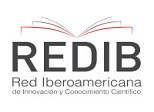La Formación de Emprendedores en la Gestión Empresarial con Enfoque de Género
DOI:
https://doi.org/10.69890/hallazgos21.v3i0.219Palabras clave:
emprendedor; formación; gestión empresarial; género; enseñanza-aprendizaje.Resumen
Para analizar la formación que han tenido los emprendedores en la Pontificia Universidad Católica del Ecuador- Esmeraldas (PUCE Esmeraldas) en la gestión empresarial, con enfoque de género, se identificó el perfil de los emprendedores que inician el proceso de capacitación y el nivel de conocimiento que reciben al culminar el curso. Se realizó un estudio cuanti-cualitativo de alcance descriptivo, utilizando el método de medición, con la aplicación de dos cuestionarios, uno inicial y otro final, recolectando información primaria. En este último, se evaluó la capacitación a través de una actividad lúdica. El estudio se aplicó a los 39 emprendedores refugiados y locales, que participaron en el curso “Gestión Empresarial con Enfoque de Género” ejecutado por la PUCE Esmeraldas y financiado por ACNUR, durante tres meses y medio, en los cantones de Esmeraldas y San Lorenzo en el año 2016. Los resultados mostraron que los emprendedores iniciaron la capacitación con un nivel de estudio secundario completo, sus experiencias laborales se centralizaron en actividades relacionadas a su negocio actual y además mantenían escasas capacitaciones en gestión empresarial y de género. Por otro lado, los emprendedores culminaron el curso con una calificación buena, referente a las temáticas que se presentaron. Se concluye que los emprendedores ingresan con un bajo nivel de conocimientos en el tema de gestión empresarial, sin orientación de género. Por lo tanto, la capacitación que se realiza a la población refugiada y local permite formar a la persona en el ámbito empresarial y social.
Citas
Catellanos, M. E. (Diciembre de 2008). Eduacaión Popular, educacion como bien público. (Geoenseñanza, Ed.). Recuperado el 5 de Septiembre de 2016, de http://redalyc.org/articulo.oa?id=36021230002
CienciaUAT. (Octubre - Diciembre de 2006). Emprendiendo en la era del conocimiento. Recuperado el 5 de Septiembre de 2016, de http://www.redalyc.org/articulo.ca?id=441942906009
Duarte, T., & Ruiz Tibana, M. (Diciembre de 2009). (U. T. Colombia, Ed.) Recuperado el 2016 de Septiembre de 22, de Emprendimeinto, una opción para el desarrollo: http://www.redalyc.org/articulo.oa?id=84917310058
Gutiérrez Huby, A. M., Amador Murguía, E., Javier, L. R., Márquez Hernández, M. L., Avelar Dueñas, A. C., & Costilla López, D. (Abril de 2013). Modelo de Incubación para Estudiantes Emprendedores. Obtenido de http://www.eumed.net/rev/cccss/24/modelo-incubacion-estudiantes-emprendedores.html
Oficina Internacional de Trabajo Ginebra. (2010). Guía para la incorporacipon de la perspectiva de género en las estrategias de desarrollo económico local. Recuperado el Octubre de 2016, de http://www.ilo.org/wcmsp5/groups/public/@dgreports/@gender/documents/publication/wcms_145711.pdf
Orrego, C. I. (Julio-Diciembre de 2008). La Dimención Humana del Emprendimiento. (R. C. Estratégicas, Ed.) Recuperado el 25 de Septiembre de 2016, de http://www.redalyc.org/articulo.oa?id=151312829001
Paredes Villacís, J. (2012). Casos de emprendimiento generados a través de la docencia en el Colegio Técnico Agroindustrial “Pedro Fermín Cevallos” año 2005-2006 hasta 2010-2011. Recuperado el 15 de Noviembre de 2016, de http://www.uasb.edu.ec/UserFiles/372/File/pdfs/PONENCIAS/XXII%20CONGRESO%20LATINOAMERICANO%20SOBRE%20ESPIRITU%20EMPRESARIAL/JULIA%20PAREDES%20(ECUADOR).pdf
Parra Alviz, M., Cática Barbosa, J., & López Montoya, O. (2012). El juego como estrategia de aprendizaje en el área de emprendimiento, creatividad y finanzas “Experiencias en aulas de clases”. Obtenido de http://www.uasb.edu.ec/UserFiles/372/File/pdfs/PONENCIAS/XXII%20CONGRESO%20LATINOAMERICANO%20SOBRE%20ESPIRITU%20EMPRESARIAL/OSCAR%20LOPEZ%20(COLOMBIA).pdf
Pineda Duque, J. A. (Junio de 2014). Emprendimiento y Género: el caso de la industria de la belleza en Bogotá (R. S. Economía, Ed.) Recuperado el Octubre de 2016, de: http://www.redalyc.org/articulo.oa?id=99630967007
Rosero, S. O., & Molina, S. L. (Enero-Junio de 2008). Sobre la investigación en emprendimiento. (I. Psicolo, Ed.) Recuperado el 21 de Septiembre de 2016, de: https://dialnet.unirioja.es/servlet/articulo?codigo=5229757
Rueda Sampedro, I., Fernández Laviada, A., & Herrero Crespo, Á. (2013). Aplicación de la teoría de la acción razonada al ámbito emprendedor en un contexto universitario. Recuperado el 13 de Octubre de 2016, de http://redalyc.org/articulo.oa?id=28928246007
Ruiz de León, C., & García Galván, J. (Diciembre de 2011). El proceso de desarrollo innovador, como una herramienta indispensable en el desarrollo local. Recuperado el Octubre de 2016, de http://www.eumed.net/rev/oidles/11/rlgg.html
Samaniego Erazo, F. d. (Julio de 2016). Diagnóstico de los emprendimientos: Caso cantón Riobamba-Ecuador . Obtenido de http://www.eumed.net/rev/caribe/2016/07/emprendimientos.html
Santos, F. J., Barroso, M. d., & Guzmán, C. (s.f.). La economía global y los emprendimientos sociales. (R. d. Mundial, Ed.) Recuperado el 25 de Septiembre de 2016, de: http://www.redalyc.org/articulo.oa?id=86629567010
Descargas
Publicado
Cómo citar
Número
Sección
Licencia
Los artículos enviados a la Revista Científica Hallazgos21 deberán ser totalmente originales e inéditos.
Los autores son los responsables de los textos y las imágenes incluidas en los artículos y no necesariamente reflejan el pensamiento de la editorial o de la Pontificia Universidad Católica del Ecuador, Sede Esmeraldas (PUCESE).
Los autores disponen cederle a la Revista Científica Hallazgos21 todos los derechos inherentes para la edición, publicación y distribución o divulgación del mismo.
Se autoriza a las revistas firmantes de los acuerdos de Encuentros de Revistas Latinoamericanas para reproducir en parte o totalmente los artículos con la sola mención de la fuente claramente señalada.







